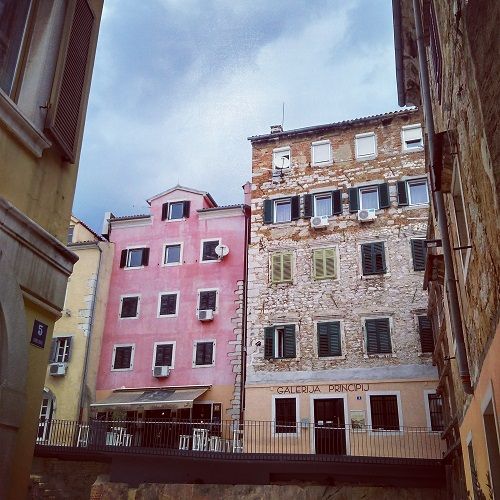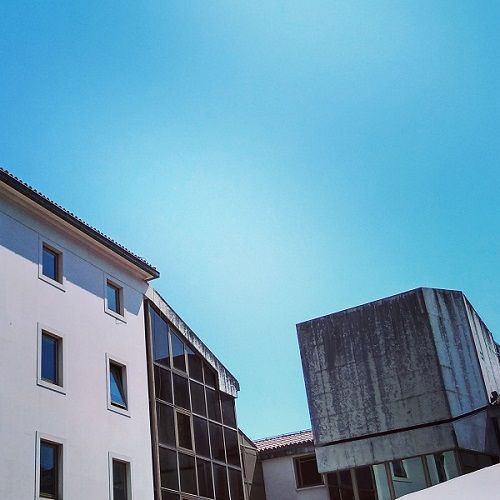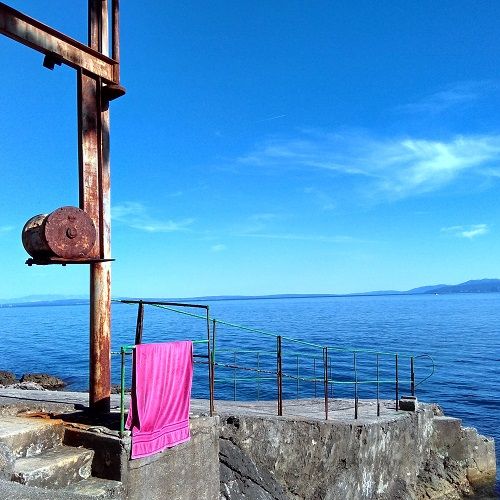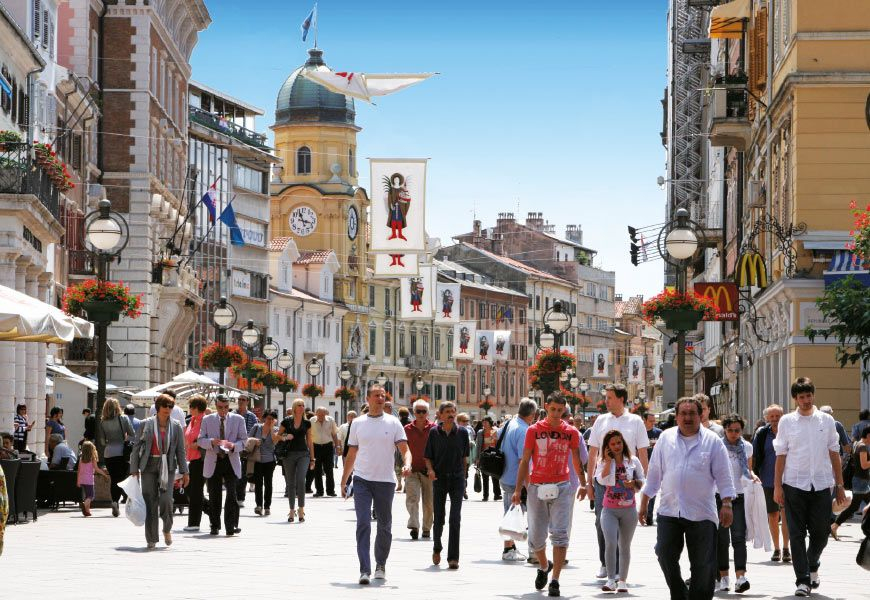Where is the best place to live in Croatia? It is a very subjective topic, and TCN’s Nikolina Demark kicks off a new series with the case for her native Rijeka.
When I moved to Zagreb in 2007, I noticed a strange thing immediately upon arrival: everybody seemed to walk at double the pace I was used to. Hiding their faces behind oversized sunglasses, passersby would dismissively brush against me, annoyed by my slow step. Everyone was in a hurry and I, a typical laid-back child of a coastal town, felt out of place.
Nine years later, I moved back to Rijeka and found myself hissing internally whenever I got stuck behind someone who wasn’t frantically running around. I missed Zagreb terribly, the place where I finally grew into the person I am today, the place where I left most of my friends. Curious enquiries on whether I planned to return to the capital resulted in a prompt “as soon as I sort things out and get a job”. Months passed, I sorted things out, and my reply turned into “maybe, if by chance I get a really good job”. I met some new people, joined a couple of projects, started writing again, then by chance got a really good job. It’s April 2017 and whenever someone asks if I’m planning to leave, I smile, for my reply has come down to one word: “Nope.”
I mean….

I have to deal with this every time I decide to look through the window. A horrible burden.
Jokes aside, beyond a pretty good chance for a nice view, making a case for Rijeka might prove a bit hard in theory. All the arguments that are often used to glorify the city seem like bullet points in a 20th-century CV, reminders of a golden age my generation didn’t get to witness. Rijeka, the booming industrial centre. Rijeka, the cradle of Croatian punk, the birthplace of the new wave music scene. Rijeka, the proud home of alternative culture. It would all seem surreal if it weren’t for the reminders scattered throughout the city: clubs that are either long closed or trying to survive on past glories, deserted factory halls whose floors are covered in shattered glass and collapsed roof beams. Their names are woven into our collective memory, but are usually referred to as locations rather than industrial titans that got run into the ground. You board a bus at Torpedo, you park at Benčić. You can’t work at either. Problematic sites are used as tokens for pre-election promises while our main bus station still consists of five terminals in the middle of the road with no shelters in sight. The railway station, once a symbol of a flourishing economy, is slowly withering away.
And yet, there’s a certain energy to Rijeka that makes it irresistible. It’s the third largest city in Croatia and has the attractive quality of not being big enough to feel overwhelming and alienating, but not small enough for anyone to get suffocated by monotony and local gossip. It’s vibrant and relaxed at the same time – as a friend of mine put it, there’s always something to do and you’ll always find someone to get a beer with, but you’ll be equally fine on your own. Rijeka makes it possible for anyone to wander around alone without making them feel lonely.

Owing to its port city status and rather turbulent history, Rijeka has always been a melting pot of numerous cultures, nations and languages, resulting in a multicultural society whose people are an open, cheerful, pleasant bunch. To be fair, the multi-culti label has been thrown around so frequently it’s starting to feel like an overstatement, especially if you keep in mind that the local population predominantly consists of white Croatian Catholic citizens, and the recent anti-migrant mentality has reared its ugly head here just as in some more conservative parts of Croatia. I choose to view that hateful fraction as an exception to the rule, believing the community remains tolerant in general and welcoming to newcomers. After all, I have yet to hear someone complain about the residents of Rijeka being dismissive as a whole.
So, once you decide to get some company for those beers I mentioned earlier, you’ll find out the most popular conversation topic is the weather. As Croatians love to chat about the weather wherever they end up, we couldn’t call this a location-specific phenomenon if it weren’t for one tiny detail: in Rijeka, it rains all the time. So much, in fact, that it’s become a local running joke. Combined with incessant violent gusts of bura wind, the rain turns into a destructive force no umbrella or raincoat can survive. It might seem I again strayed from making a case for Rijeka, but the weather only adds to local spirit: we’re never unprepared and nothing can bring us down. Whatever the forecast says, you quickly learn to always don a pair of sunglasses, pop a mini umbrella into your bag, and go about your day. Speaking as someone who is used both to Zagreb and Rijeka climates, I’d take a bit of rain over the tedious continental snow any day.

As I’m already using Zagreb as a point of comparison, let’s take a moment to remember how easy it is to get around the capital on foot, by tram or using any other means of transport. Sure, the city could use a couple of extra bike lanes and the traffic jams can get a bit nerve-wrecking at times, but the existing urban grid is not something to complain about. Enter Rijeka, where getting around must be a hellish quest for those who arrive for the first time. There are two main avenues going through the city centre, both of them being one-way roads; whenever an accident occurs, no matter how insignificant, the traffic completely shuts down for an hour. Cycling is virtually impossible except on Korzo, the long promenade in the city centre on whose ends the rest of the city suddenly goes uphill. Public transport is a story for another time. Living in Rijeka means a lot of walking, even more stairs, and loads of traffic-induced frustration. In other words, it keeps you in shape, builds character and helps you learn not to sweat the small stuff. Not to mention, if you learn how to drive in Rijeka, you’ll never have a problem elsewhere in Croatia.
I can joke about pros and cons, but there’s one argument in my city’s favor that can’t be disputed. It’s true that Rijeka doesn’t know the concept of green spaces and we grew up playing in the street, not in parks and lawns in the city centre. You know what makes up for all the concrete? The sea. There’s a lot more to it than a punchline about the view. Living on the coast means growing up with a very particular sense of freedom and never feeling incarcerated by your own city; it means walking around the centre, throwing a glance between any two buildings and seeing the open sea. Even if you’re not the nostalgic type, that’s the thing you miss the most once you move to Zagreb, where the only thing to see between two buildings is another one. When I take a look through my window at night and notice a handful of tiny specks of light on the dark horizon, I know the market will be overflowing with fish the next morning. When I need to unwind, it takes me a short ride to get to the nearest promenade by the sea. Come summer, I don’t need to wait for vacation days – I can change my clothes after work, throw a towel over my shoulder and find myself here in 15 minutes:

Rijeka is one of few coastal cities in Croatia that don’t die down in winter. The further to the south you go, the more you’ll notice life suddenly getting quiet when the tourists leave, whereas Rijeka remains a lively place throughout the year and offers a lot to see and do whenever you choose to drop by. This city is a bewildering combination of Mediterranean charm and imperial continental class: as you walk around, you’ll notice both the faint whiff of Austro-Hungarian order and the prevalent endearing chaos, the latter being a mixed result of the Italian influence and the Balkan mentality. To quote another friend, Rijeka contains tiny fragments of all other cities in the world; you’ll find yourself in a particular street or sense a certain scent in the air and think of your hometown. It’s a city no-one is able to resist, a city that welcomes everyone with open arms. I, for one, am happy to be learning how to slow down again.
Want to know more about Rijeka? Take a look at our list of 25 things about the city here!











